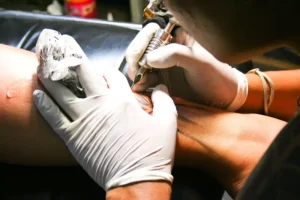
Between 3 and 5 percent of people withdrawing from alcohol develop grand mal seizures and severe confusion, known as delirium tremens. Delirium tremens symptoms typically begins about three days after other withdrawal symptoms start. It usually lasts for between two and three days, and it can be fatal. By this stage, their drinking is taking an obvious physical toll as well. They may appear red in the face or look bloated and generally unwell. The alcoholic probably isn’t sleeping or eating well at this point and may not be keeping up with personal hygiene.

drinking alcohol after removal of the spleen
Most of these causes aren’t serious and don’t require treatment. You should discuss with your doctor to pinpoint what is causing your frequent or unexplained bruising. Research indicates Cushing Syndrome is caused by prolonged exposure to high circulating levels of cortisol. “Excess cortisol can lead to increased bruising,” Dr. Posnia says. Sometimes bruises seem to appear out of nowhere after weightlifting or any other intense workout. Coppola says very high impact weight lifting, aerobics, or running can cause increased intravascular pressure and shearing forces against muscle do you bruise easier when drunk tissues that may cause tears and result in a bruise.

What are the most common causes of myocardial infarction (heart attack)?
These bruises from sun damage usually don’t cause any pain or soreness. Vitamin C is essential to healing and collagen formation, and when you’re not getting enough of it, you may start to bruise easily. These include aspirin, the corticosteroids prednisone and prednisolone, anticoagulants, antibiotics, and blood thinners (including certain dietary supplements, such as fish oil and ginkgo). If a medication is the likely cause of easy bruising, your healthcare provider can reevaluate the benefits versus the risks of continuing to take it.
- Disorders that reduce your ability to clot blood, such as hemophilia and von Willebrand disease, may also affect your bruising frequency.
- Growing up in Louisiana with addiction running rampant on both sides of my family.
- Years of chronic alcohol consumption have ravaged their body and mind, and their lives revolve around little else other than the bottle.
- Cushing’s is most often caused by long-term use of corticosteroid medications, but it can also be caused by a tumor.
- The fatty layer that provides some protection against bruising also thins with aging.
Start building healthier drinking habits today.
- When a blood vessel injury occurs uncontrolled bleeding and bruising results.
- Blood contains ingredients that are carefully balanced to protect us from bleeding if we are injured, while simultaneously minimising the risk of dangerous blood clot formation.
- Learn the answer, as well as how to get help with medication assisted treatment for alcohol use, below.
- Your healthcare provider can discuss the potential benefits of iron supplements with you.
Finally, one potentially serious cause of alcohol and bruising is alcohol liver disease. As liver functioning declines from chronic alcohol misuse, a person is likely to bleed and bruise easily. A host of proteins (clotting factors), attracted by the platelets and damaged vessel wall, then combine to thicken the blood at the site and form a blood clot. Like all blood cells, platelets are made in the bone marrow, while clotting factors are mostly made in the liver.

Signs Your Body Is Telling You You’re Drinking Too Much

For some of us, half a dozen drinks during a night out aren’t yet enough to faze us. And yes, you may feel great and energized upon waking up—but that doesn’t mean you didn’t have too much to drink the night before. Plus, you’re more susceptible to an accidental fall what is Oxford House or bump after you’ve been drinking, anyway.
- That said, it’s still important to eat a healthy, well-balanced diet containing plenty of vitamin C, vitamin K, and other important nutrients.
- They may wish to discuss the risks and benefits of continuing treatment.
- Second, alcoholism can lead to a condition called thrombocytopenia, which is a low level of platelets in the blood.
- Bruises that take a long time to heal or getting bruised for no apparent cause could be signs of a bleeding disorder.
- However, easy bruising can sometimes be a sign of a more serious problem.
- There are a number of medications and supplements that can increase your risk of bruising.
- “Any medications that have a blood-thinning effect or reduce your blood’s ability to create clots will trigger bigger bruises after experiencing impact on the body,” Dr. Johnston says.
- However, if you bruise easily, you have unexplained bruising, or the bruising is accompanied by bleeding elsewhere, it could be a sign of a condition that needs medical attention.
- When blood vessels are dilated, you’re more likely to experience a bruise after bumping into something.
- When you bump against an object, your body normally responds by forming clots to stop the bleeding, which prevents bruising.
- And yes, you may feel great and energized upon waking up—but that doesn’t mean you didn’t have too much to drink the night before.
- Someone who lives with an alcohol use disorder may experience lasting brain changes that make it difficult to stop drinking.
When this happens, blood leaks out of the vessels and initially appears as a dark mark. Eventually the body reabsorbs the blood, and the mark disappears. Medications like clopidogrel (to stop problem clotting) and non steroidal anti-inflammatory drugs (like ibuprofen or others taken for pain and inflammation) can reduce platelet function. Blood thinners such as warfarin, apixaban and rivaroxaban, prescribed to people with a higher risk of clots leading to stroke, can affect bruising. If a “puncture” occurs in a blood vessel, blood can rapidly thicken to form a jellylike clot, to minimise blood loss until the vessel repairs itself. To achieve this, tiny cell fragments called platelets that circulate in the blood bind to the damaged blood vessel wall.